YOU SHOULD SUBSCRIBE TO CLIMATE CHANGE WEEKLY.
IN THIS ISSUE:
- China Scraps (Already Scant) Climate Cooperation Over Pelosi Taiwan Visit
- Podcast of the Week: A Tale of Two Climates: One Real, One Imaginary (Guest: Bill Pekny)
- Fossil Fuel Bans Hurt Women, Poor
- Pacific Cyclones Trending Down
- Europe’s Vegetable Oil Use Growing, as Are Emissions
- Video of the Week: Exploring Energy – Biofuels
- BONUS Video of the Week: Breaking Down Biden’s Climate Bill
- Climate Comedy
- Recommended Sites
China Scraps (Already Scant) Climate Cooperation Over Pelosi Taiwan Visit

The Chinese Communist Party was very displeased with U.S. House Speaker Nancy Pelosi’s (D-CA) well-publicized visit to Taiwan reaffirming the United States’ commitment to the island’s continued independence from mainland China. To demonstrate its displeasure—in addition to the usual rattling of sabers, sending of new naval ships into the area, flying jets into Taiwanese airspace, and test-firing missiles into the sea around the island—China announced it was suspending cooperation with the United States in the fight against climate change. Heaven forbid!
After managing to control my uproarious laughter about China’s announcement, the first thought that popped into my mind was, what cooperation?
Dialogue and discussions have certainly done nothing thus far to reduce China’s greenhouse gas emissions, which are more than twice as great as those of the United States, and growing. China emits more greenhouse gases than every other industrialized country on the planet combined. Mouthing empty platitudes about the need to work together to fight climate change does not fight climate change, even if one truly believes people can stop climate change.
As should be the case in every country (and as Donald Trump tried to do for America), China’s leaders have looked out for what they consider to be their nation’s best interests during every round of climate meetings and in treaty and agreement negotiations since 1995. At the very first Conference of the Parties to the UN Framework Convention on Climate Change in Berlin, China declared it would always count itself as a developing country in climate change agreements. That meant China would be exempt from mandatory greenhouse gas emission reductions. Regardless of what it has said in public since then, the Chinese government has never wavered from this position.
China played the rest of the world’s leaders like a drum during the negotiations for the Paris Climate Agreement in 2015. In an agreement that included no mandatory reductions except what countries imposed on themselves, all China would concede was that it expected its emissions to peak by 2030, maybe 2035. Climate negotiators and leaders of environmental NGOs hailed this as a historic step. Climate realists such as I asked: Peak at what level? Chinese Communist Party leaders smirked behind their hands at their PR coup. Our question has gone unanswered to this day.
If one believes, as I do not, that human greenhouse gas emissions are driving dangerous climate change, the question of where China’s emissions will peak, if they peak at all, is critical. By the UN’s own calculations, a doubling of China’s emissions would be game over for the world even if every developed country reaches net zero. Even if China’s emissions rise by only 15 to 25 percent, that would swamp any emission reductions from the West. And this is without accounting for what is going on in India, Indonesia, and other fast-developing countries. Emissions globally will greatly surpass the amount that would allegedly bring on the 2℃ temperature rise that Paris negotiators and climate NGOs claimed to be the point of no return for the planet.
Since then, China has embarked on a rapid further expansion of its fleet of coal-fueled power plants, its heavy industry (needing massive amounts of concrete and energy), and its military, all increasing China’s carbon dioxide emissions.
As I reported in Climate Change Weekly 433, China’s cabinet approved a plan this April to raise coal production by 300 million tons in 2022 alone, equal to 7 percent of the nation’s entire 2021 output. This after China increased coal production 5.7 percent above 2020’s output in 2021.
As NPR noted at the time, cabinet officials came out of the meeting saying, “Coal is important for ‘energy security.’” Simultaneously, the Chinese government announced plans to build new coal-fueled power plants to shore up the nation’s power supply.
That’s what China is doing, while saying it now expects to hit net zero by 2060. With this ongoing buildout of modern coal-power plants with productive lives that meet or exceed 50 years, no one can seriously believe China will shut down its new, expensive electric power plants prematurely and stunt or slow its economic growth.
Almost anyone with a functioning brain cell knows actions speak louder than words. China’s actions have spoken volumes about its “cooperation” with the United States and the rest of the world in the fight against purported climate change. Long before Pelosi set foot on Taiwanese soil, it was clear China is on the side of climate change if greenhouse gas emissions are indeed causing climate change. China is emitting carbon dioxide and other greenhouse gases as fast as its energy system and industrial facilities can churn them out.
SOURCES: South China Morning Post; Climate Change Weekly
Podcast of the Week
The climate was not stagnant before human carbon dioxide emissions. Rather, Earth’s climate is consistently changing across a variety of timescales. It has been warmer and cooler than it is today. There is no evidence we are in the midst of a climate crisis driven by carbon dioxide emissions. Earth’s present warming is similar to the warming experienced during every previous interglacial cycle throughout its history. Carbon dioxide is not a pollutant. It’s necessary to life.
Subscribe to the Environment & Climate News podcast on Apple Podcasts, iHeart, Spotify or wherever you get your podcasts. And be sure to leave a positive review!
Get your Copy at Amazon TODAY!
Fossil Fuel Bans Hurt Women, Poor

A paper published in the peer-reviewed journal Nature says fighting climate change by banning or significantly limiting the use of fossil fuels harms the poor, especially poor women.
Paper author Vijaya Ramachandran, director of energy and development studies at California’s Breakthrough Institute, notes as many as 2.6 billion people, primarily in developing countries, experience energy poverty—“the lack of access to clean fuels”—and as a result end up cooking “on open fires or stoves using kerosene, coal, wood, animal waste or other forms of biomass.”
Each year, more than 3.8 million people die prematurely from illnesses linked to household air pollution, often resulting from cooking with biomass. This means more deaths can be tied to illnesses related to biomass use than from tuberculosis, malaria, and HIV/AIDS combined.
Poor women and young girls account for a disproportionate number of the biomass-related illnesses and deaths, because they do most of the cooking and household chores. Even if not killed or made ill, these women “lose time, security, and income because they must gather fuel; girls who might otherwise go to school go out to collect wood or cow pats.”
A modern electric grid powered by fossil fuels and nuclear, plus modern appliances burning natural gas, looks like the best hope for alleviating poverty and improving these women’s lives in the long run. Millions of women have already by been saved by the adoption of appliances using liquefied petroleum gas (LPG). However, Ramachandran points out, expansion of these improvements, especially electrification, is being hampered by developed countries’ efforts to ban financing of projects that use fossil fuels. Ramachandran concludes,
SOURCE: Nature
Heartland’s Must-read Climate Sites
Pacific Cyclones Trending Down
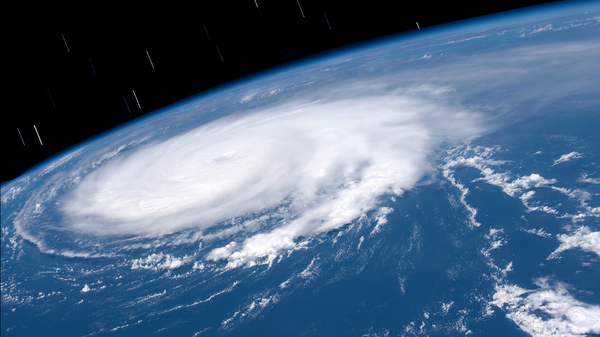
We in the United States pay careful attention to tropical storms and hurricanes in the Atlantic Basin each year, and we hear much less about Pacific typhoons. Data from the Japan Meteorological Agency (JMA) shows typhoons in the Pacific have been trending downward for 70 years.
Even though the world has modestly warmed over the past century, data from the JMA going back to 1951 demonstrate a declining trend for Pacific typhoons forming in the month of July in particular, and from January to July more generally, No Tricks Zone reports. A picture is worth a thousand words, so here are two figures plotted using JMA data:
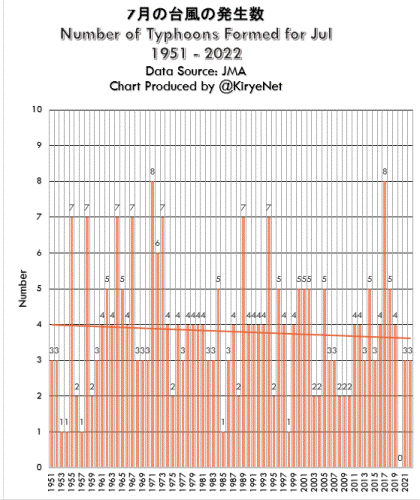
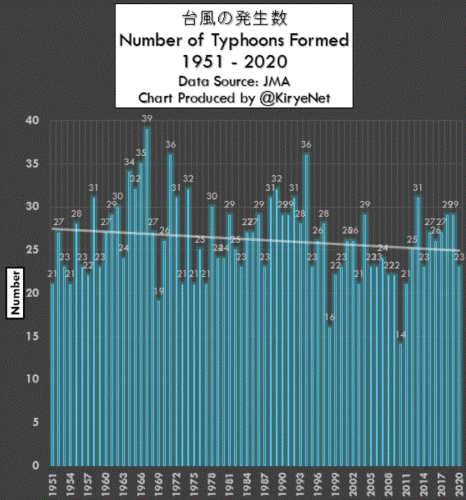
“This is the opposite of what climate ‘experts’ said would happen,” reports No Tricks Zone. The Pacific typhoon trend measured by the JMA is consistent with trends of Atlantic basin tropical storms and hurricanes, as discussed in Climate Change Weekly 439.
SOURCE: No Tricks Zone
Europe’s Vegetable Oil Use Growing, as Are Emissions

Government mandates are causing drivers in Europe and the United Kingdom to use the equivalent of 17,000 tons—about 19 million bottles—of cooking oil and 14 million gallons of palm and soy oil for fuel every day, The Guardian reports. Those fuels are as much 250 percent more expensive than they were before 2021, in part because of the war in Ukraine, Europe’s largest supplier of rapeseed and the world’s largest source of sunflower oil. Much of the palm and soy oil are from Indonesia and South America, respectively, shipped to the EU in vessels and vehicles using fossil fuels.
Those interviewed by The Guardian complained vegetable oils and the crops used to produce them are being diverted from supermarkets to fuel-manufacturing during an ongoing food supply crisis.
The Guardian reports, “’Supermarkets have had to ration vegetable oils and prices are soaring,’ said Maik Marahrens from the campaign group Transport & Environment, which carried out the research. “At the same time, we are burning thousands of tons of sunflower and rapeseed oil in our cars daily. In a time of scarcity we must prioritize food over fuel.”
The study cited by The Guardian reports “about 10% of the world’s grains are … turned into biofuels, enough to feed 1.9 billion people for a year on some estimates.”
A second study states, “If the land abroad used to grow the UK’s bioethanol were instead given over to food crops, an extra 3.5 million people a year could be fed.”
Leaders of some environmental groups have belatedly concluded burning food for fuel is immoral.
“At a time when Russia’s war threatens people in less developed countries with starvation, it’s indefensible to keep increasing biofuel use,” Dustin Benton, the Green Alliance’s policy director, told The Guardian. “Cutting back on biofuels is the fastest way of addressing global hunger in this crisis.”
Adding insult to injury, the lifecycle emissions from converting land, harvesting, distilling, transporting, and burning vegetable-based fuels can be even greater than those from fossil fuel use, because the fuel crops are often grown on previously unfarmed land or displace virgin forests, The Guardian reports.
“The cost of biofuels is greater than the benefit from any reduced use of oil,” Timothy Searchinger, a Princeton University scholar and senior fellow at the World Resources Institute, told The Guardian. “The error Europe and others have made is that they ignore this cost entirely. They act as though using land were free. The food crisis we are in reminds us that is not true.”
SOURCE: The Guardian
Video of the Week: Exploring Energy – Biofuels
In Exploring Energy ep3, Linnea Lueken covers the ins and outs of the United States’ use of biofuels. The US Environmental Protection Agency (EPA) mandates blending biofuels into gasoline, imposing higher costs on Americans in the process. In 2022 alone, the EPA’s mandate requires blending 20.63 billion gallons of conventional biofuels, including ethanol, into the nation’s fuel pool.
BONUS Video of the Week: Breaking Down Biden’s Climate Bill
Immediately after Senate passage, the so-called “Inflation Reduction Act” was praised in the corporate media and among activists on the left as being the most-significant climate action the U.S. government in our history. But just like the bill won’t improve our runaway inflation rate, it will also do absolutely nothing to improve our weather or decrease the global temperature by the end of the century.
After about $400 billion more in taxpayer subsidies for green energy, the temperature might decrease by between about three-hundredths (0.028F) of a degree and nine-ten thousandths (0.0009F) of a degree. Maybe. On this edition of Climate Change Roundtable, The Heartland Institute’s H. Sterling Burnett, Linnea Lueken, and Steve Milloy join Host Jim Lakely to discuss the “climate fighting” aspects of the latest Washington boondoggle spending bill. Just how bad is it?
Tune in every Friday at noon CT for another LIVE episode of Climate Change Roundtable.
Climate Comedy
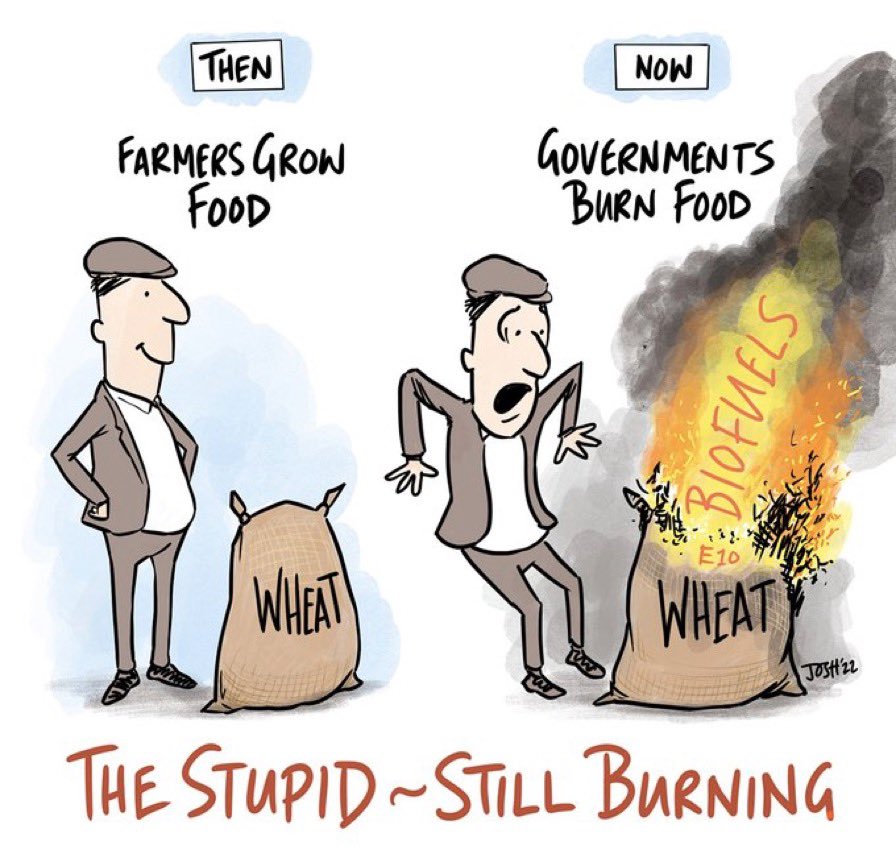 via Cartoons by Josh
via Cartoons by Josh



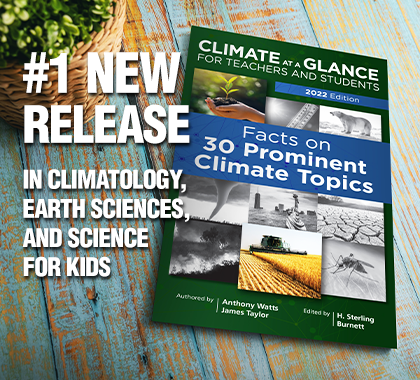


























[…] From Heartland Daily News […]
[…] From Heartland Daily News […]
[…] From Heartland Daily News […]
[…] From Heartland Daily News […]
[…] From Heartland Each day Information […]